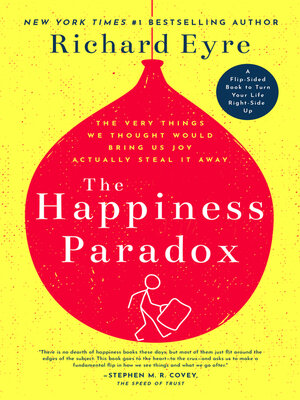The Happiness Paradox the Happiness Paradigm
ebook ∣ The Very Things We Thought Would Bring Us Joy Actually Steal It Away
By Richard Eyre

Sign up to save your library
With an OverDrive account, you can save your favorite libraries for at-a-glance information about availability. Find out more about OverDrive accounts.
Find this title in Libby, the library reading app by OverDrive.



Search for a digital library with this title
Title found at these libraries:
| Library Name | Distance |
|---|---|
| Loading... |
New York Times–Bestselling Author: "The message resonates in today's workaholic culture that rewards hard work and stress with . . . more hard work and stress." —Deseret News
In this book, the author of the #1 New York Times bestseller Teaching Your Children Values and The Entitlement Trap, Richard Eyre, contends that the three things today's society desires most—control, ownership, and independence—are, paradoxically, what bring the most discouragement and unhappiness in our lives.
Providing a mind-changing exploration of the inherent problems with our fixation on material possessions, control over our lives, and independence from others, Eyre responds with a unique and engaging counterpoint on how to switch to the joy-giving alternatives of serendipity, stewardship, and interdependence and thus live a more verdant and abundant life. The first half, The Happiness Paradox, explores today's challenges to happiness. The second half explores The Happiness Paradigm: How A New View Can Turn Your Life Right-Side Up—and walks us through a mental paradigm shift that can change our lives and our search for lasting joy.
In this book, the author of the #1 New York Times bestseller Teaching Your Children Values and The Entitlement Trap, Richard Eyre, contends that the three things today's society desires most—control, ownership, and independence—are, paradoxically, what bring the most discouragement and unhappiness in our lives.
Providing a mind-changing exploration of the inherent problems with our fixation on material possessions, control over our lives, and independence from others, Eyre responds with a unique and engaging counterpoint on how to switch to the joy-giving alternatives of serendipity, stewardship, and interdependence and thus live a more verdant and abundant life. The first half, The Happiness Paradox, explores today's challenges to happiness. The second half explores The Happiness Paradigm: How A New View Can Turn Your Life Right-Side Up—and walks us through a mental paradigm shift that can change our lives and our search for lasting joy.







